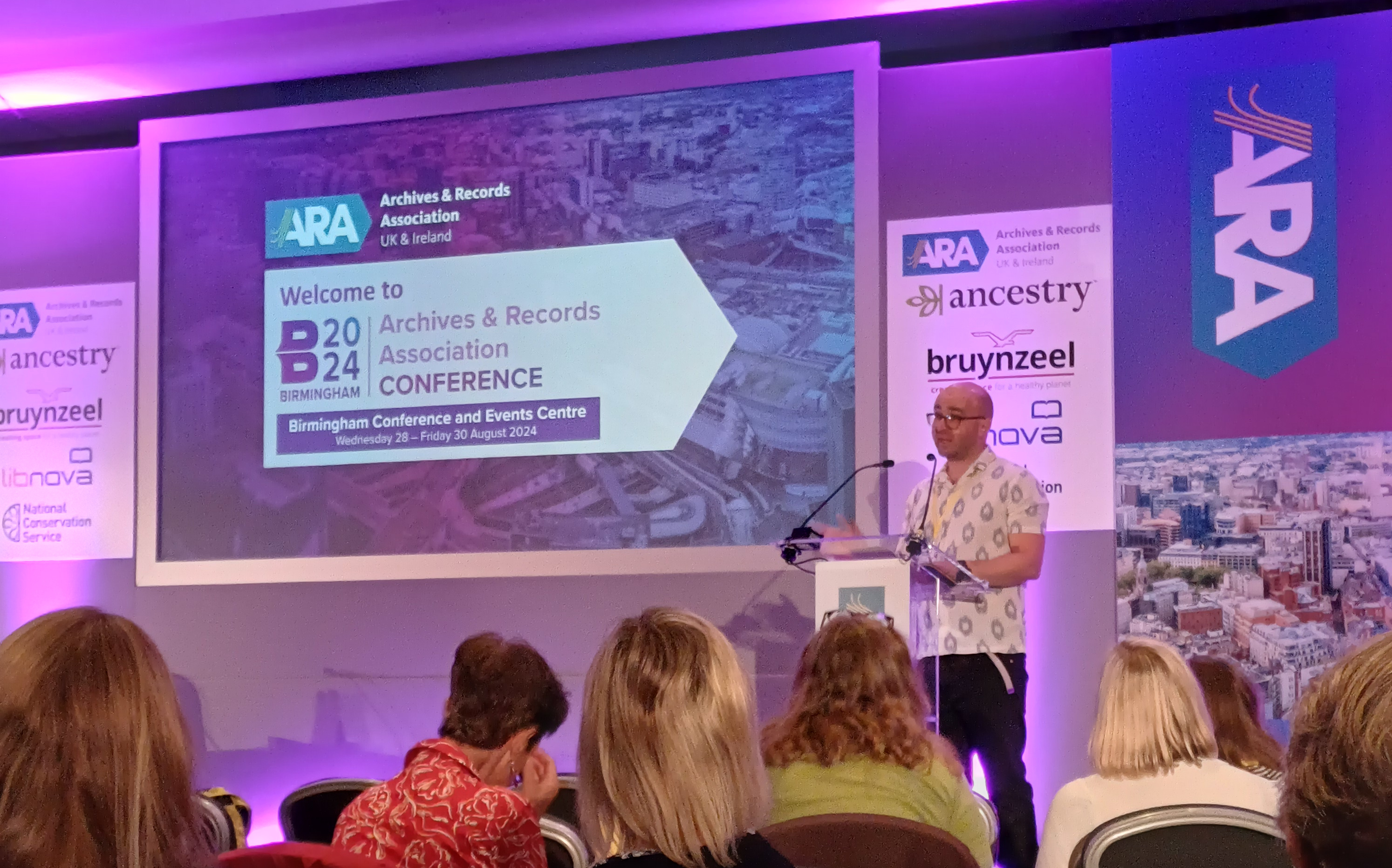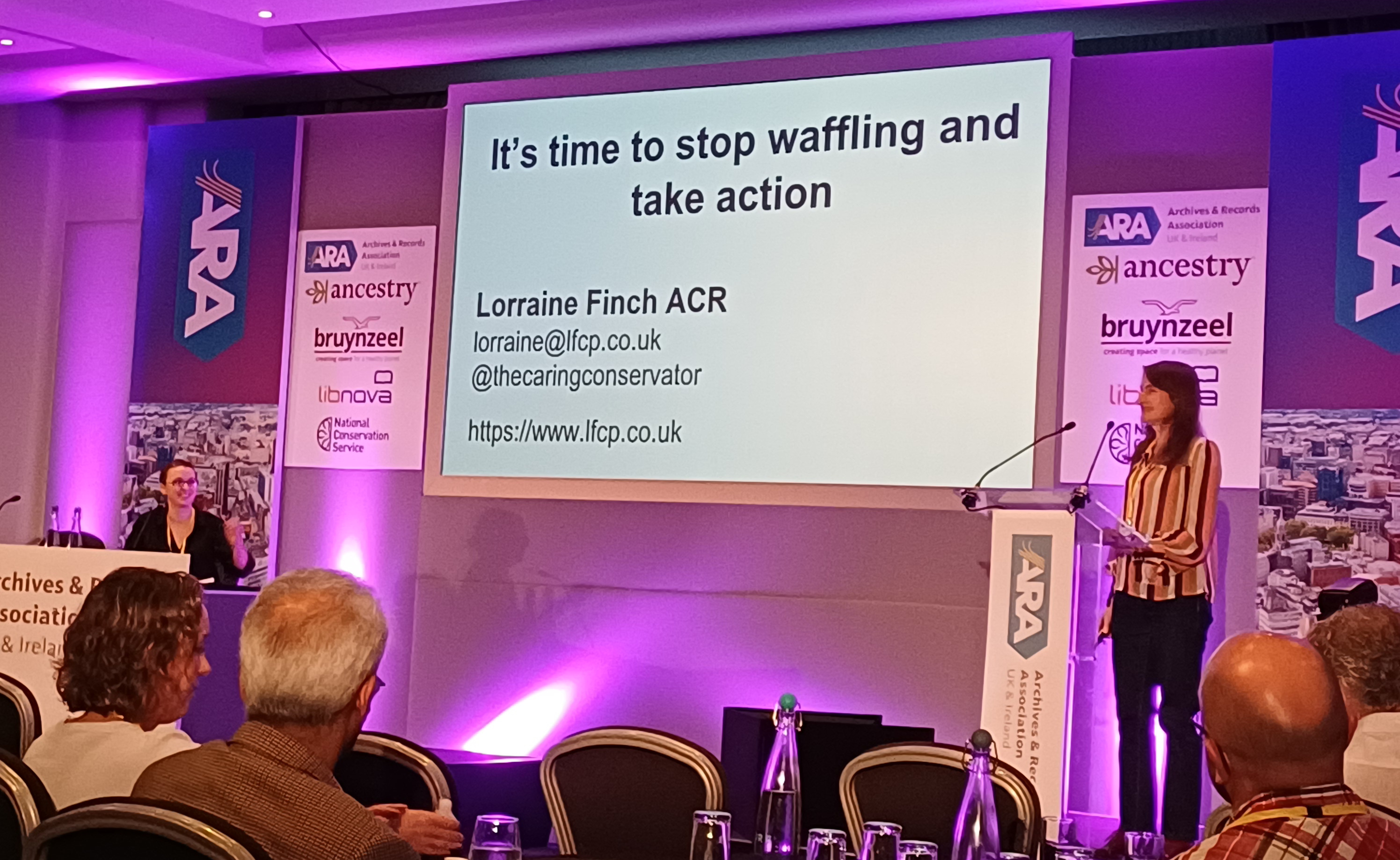Last month the Archives and Records Association held their annual conference in Birmingham, bringing together archivists, records managers and conservators from across Britain and Ireland. The focus of the conference this year was ‘Climate and Crisis’, addressing important questions about the sustainability of the sector and the role of archives in tackling climate change. In this blog post, our archivist Simon Mackley reports back on some of the conference themes and reflects on the sustainability of our own work here at Surrey.

Climate change poses an immense threat to the survival of our archive heritage. Across the world, many libraries and repositories are already running the risk of outright destruction in the face of extreme weather, wildfires, and rising sea levels. Given this backdrop, it was no surprise therefore that this year’s Archives & Records Association Conference focused on the pressing need for the archives sector to embrace sustainability in all that we do, and pivot towards new ways of working that can aid the fight against climate change. As one of the speakers, Michaela Hart, vividly stated in her conference talk, there are after all ‘no archives on a dead planet’.
Given the enormity of the stakes, it was brilliant to hear of all the different ways archive services are rising to the challenge. It would be impossible to try and cover everything from the conference in a single blog post; instead, I thought I’d briefly talk about three key themes that emerged from the speakers and discussions.

Sustainable Storage
One area where the sector is moving towards greater sustainability is in rethinking how we design and manage our archive stores. To protect them from damage and decay, archives need to be stored in suitable environmental conditions with controlled, stable temperatures and humidity. This has traditionally been achieved through heavy reliance on energy-intensive air conditioning and climate control systems, run at great cost both financially and environmentally.
As a more sustainable alternative, many archive services have instead moved towards a ‘passive preservation’ approach, whereby strongrooms are designed so that the appropriate storage conditions are maintained naturally, without the need for intervention systems. It was fascinating to hear the speakers discuss their experiences of passive approaches in their archives: I was particularly interested to hear Elizabeth Parfitt’s talk on their experience of building an underground passive strongroom at Conwy Archives, including some of the unexpected obstacles they faced. Although not without their challenges, it is clear that by and large passive approaches are proving successful, delivering significant environmental benefits.
Here at Surrey our current archive stores unfortunately are not suited for a fully passive approach – however we are pleased to say that we have made progress in reducing their environmental impact. Whereas historically we sought to maintain a constant temperature and relative humidity in our stores, in recent years we have moved to a ‘corrective’ approach, utilising air conditioning and dehumidifier units only when the environmental conditions risk moving out of safe bounds. While not a perfect solution, this has allowed us to significantly reduce our energy usage, while still maintaining a suitable storage environment.
Greener Services
Reducing the energy consumption of our archive storage is only part of the solution – we also need to look at greener ways of providing services for archive users, and it was fascinating to hear from the conference speakers about some of the different ways services are responding to the challenge. Initiatives included hosting environmental volunteering groups and prioritising the cataloguing of collections that can help with climate advocacy, but also simple steps such as reducing the amount we print – as one of our keynote speakers Lorraine Finch pointed out, even small changes repeated over time can make a huge difference.

I was particularly impressed by Rebecca Bowd’s presentation on virtual reading room services at the University of Huddersfield. Virtual reading room services – where a researcher consults archive materials remotely via video link – are something that I’ve worked with before in a previous role, but I had never previously considered their environmental benefits. In her paper, Rebecca explained that by providing virtual access and eliminating unnecessary travel, even over short distances, archive services can greatly reduce the carbon footprint of many of their users.
While we do not currently offer a virtual consultation service here at Surrey, we do provide researchers with remote access to collections through our reprographics service. Although we primarily offer this service as a means of making our collections more accessible, it is also fascinating to look at it through a sustainability lens. While there will undoubtedly always be a need for traditional archive research visits, we should perhaps consider how we can support the environment by further strengthening our remote services in the future.
The Digital Dimension
If we’re thinking about the environmental impact of our services, then we also need to assess our digital archive collections. Digital records are a critical part of our documentary heritage that need to be preserved for future generations – yet if we are to be serious about sustainability, we need to be careful about what we’re keeping. An accumulation of ROT (Redundant, Obsolete and Trivial information) not only makes it harder to identify and preserve records of genuine value; it also requires ever-greater storage capacity, with increased demands for energy usage and accompanying carbon emissions.
It was great therefore to hear from the conference speakers about the ways in which we can tackle this challenge. David Jenkins’ paper for instance was full of practical tips for how to advocate for better digital records management – including championing initiatives such as Digital Cleanup Day. I was also particularly struck by Rachel MacGregor’s paper, which stressed the need for digital curators to embrace the archivist’s “dark art” of appraisal – the process by which archivists assess collection material for archival value, and decline or dispose of material judged not to be of future use. Appraisal decisions are sometimes controversial, because they can be seen as interfering with the archival record. Yet given the environmental costs of unmanaged digital storage, simply holding on to everything is not a neutral act either.
Within our own archive service, we’ve been working over the past year to expand our digital capacity – and it’s been fantastic to see an increase in the volume of new digital archives we’ve been receiving. At the same time however, it’s clear to me that if we’re to be serious about sustainability, we need to be careful and responsible about what we agree to preserve – and this will need to be an important dimension to consider as we continue to build our digital collections going forward.

The threat of climate change is incredibly serious, and it can sometimes be difficult to consider the future without a sense of profound anxiety. Yet if there is one key takeaway from this year’s ARA Conference, it is that we are none of us powerless in the face of the climate crisis. Instead we can all take action to bring about a more sustainable future, for our archives and for our whole planet.
The Archives & Records Association Conference was held in Birmingham from 27th-30th August 2024. Speakers at the conference mentioned in this blog post include: Michaela Hart (Australian Society of Archivists); Elisabeth Parfitt (Conwy Archives); Lorraine Finch (LFCP); David Jenkins (NHS England, previously University of Leicester); Rebecca Bowd (University of Huddersfield); and Rachel MacGregor (University of Warwick). See the ARA 2024 conference website for a full list of speakers and papers.
